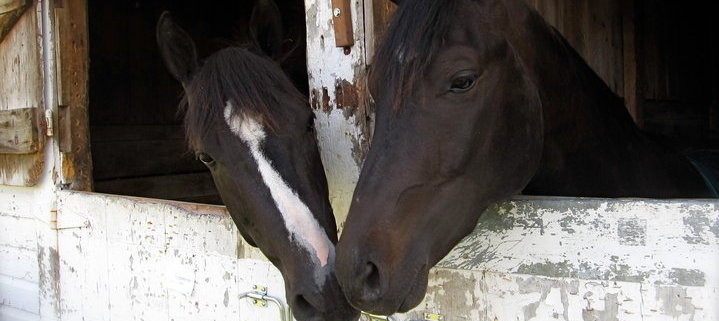Worms in Horses
If you have ever taken care of a horse, you know regular de-worming schedules are part of normal horse-care. Worms are very common in horses and around barns, so most equine veterinarians do not perform regular fecal exams like canine & feline vets. Instead, horse owners should follow a regular de-worming schedule, rotating between the different types of de-worming medications to ensure that all types of intestinal parasites are managed. If you horse has a particularly difficult case of worms, your vet will want to do a fecal exam to identify what type they have to ensure it is properly treated.
Most worms grow and reproduce within the GI tract where they can damage internal tissue and surrounding blood vessels leading to anemia, weakness, diarrhea or colic. Left untreated the parasites will continue to breed and multiply which can lead to GI distress, poor coat condition, colic, and damage to the lungs or blood vessels. Horses can get worms from their grazing environment or from the feces of other horses.
Bloodworms
Adult Bloodworms (strongyles) are found in the large intestine. Like other worms, the eggs are passed in manure and ingested by horses when grazing. The larvae move to the arteries that supply the intestine where they damage the blood vessel walls and can cause colic.
Roundworms
Horses pick up Roundworms (ascarids) from grazing in ears with eggs from infected manure. The larva spread to the liver and lungs. Horses will cough up the immature worms and swallow them where they grow and lay eggs. Eggs are shed in the manure, continuing the life cycle. Roundworms are very hardy and can live in soil for months or years! Adult worms present in the horse’s feces look like spaghetti.
Pinworms
The eggs of pinworms are laid around the horse’s anus and are extremely itchy. If your horse is rubbing its tail a lot you should check them for pinworms.
Tapeworms
Tapeworm larva live in the intestines of lice & mites so tapeworm larva are introduced to the horse’s system when they ingest an intermediate host. The body of a tapeworm is segmented so when the adult worms appear in feces they look like rice. Tapeworm are often undiagnosed in horses, but are very common. They live in the horse’s intestines and feed off of the horse’s food causing digestive problems, colic and malnourishment.
Regular veterinary exams will help protect your horse from serious internal parasite infection because your vet will be able to detect any problems before they get too large. Since many worms are shed in feces, good manure removal is key to preventing worms from spreading in your pastures. Feeding hay in nets and grain in buckets is another way to keep horse’s mouths away from manure.
Studies
Strongyle infections and parasitic control strategies in German horses – a risk assessment.
Anthelmintic resistance in equine nematodes.
Anthelmintic efficacy on parascaris equorum in foals on Swedish studs.
SvSXP: a strongylus vulgaris antigen with potential for prepatent diagnosis.
The strongylidae belonging to strongylus genus in horses from southeastern Poland.


